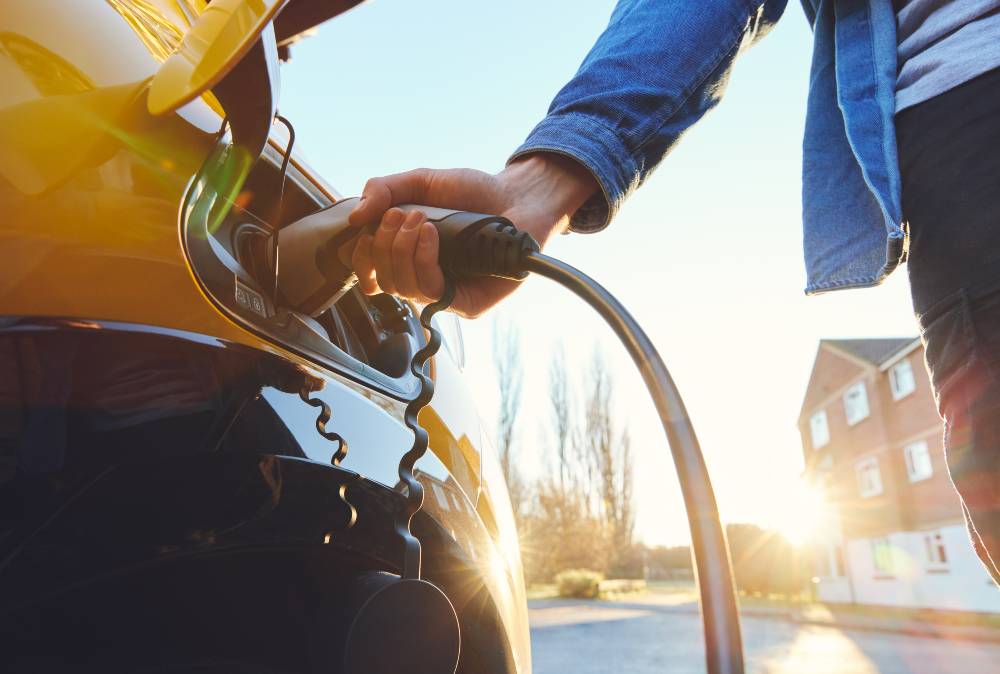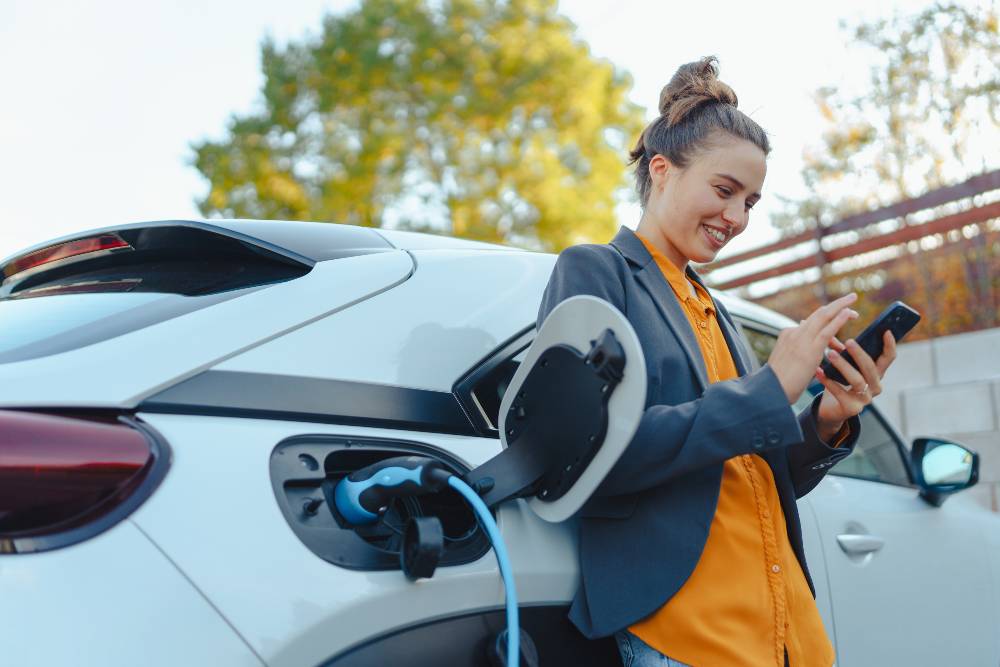How Much Electricity Does an Electric Vehicle Use?

In 2022, the Global EV Outlook reported a record-breaking 10 million electric cars sold worldwide. They forecast that EV sales will grow by another 35% in 2023, producing approximately 14 million EV sales globally.
The worldwide electric car market is exploding. Between the push for a global net-zero 2050 outlined by The Paris Agreement and the rising cost of gasoline, more and more consumers are considering renewable alternatives when choosing their next vehicle. In addition, lower operating costs, falling prices, and government incentives are making EVs more appealing to consumers than ever before.
One of the top questions on every EV owner's mind is their electricity usage. Everyone wants to know exactly how much energy they should expect to consume while they travel and, just as significantly, how much money it will cost them. Understanding your estimated electricity consumption allows you to predict average costs, evaluate miles of range, plan your charging schedule, and assess your environmental impact.
As one of America's leading providers of efficient, affordable solar energy systems, SunPower is at the forefront of sustainability in the U.S. We have the experience and expertise to provide innovative EV charging systems, expert advice, and helpful guidance about all things EV. That's why we've created this guide to provide you with more information about electric cars and their energy use.
We’ll explore how much electricity EVs use on average, how to save money when driving and charging your vehicle, and how to gain a more precise estimate of your EV's energy consumption.
How much electricity do electric vehicles use?
Predicting average energy usage can be challenging because it depends on several factors. The estimated energy consumption of your EV is impacted by how far you travel, how often you drive, and how fast you go.
That said, a rough estimate is better than no estimate, and a basic understanding of your estimated electricity usage will help you make more informed decisions about your energy consumption and how to reduce it. Let's take a look at the average electricity usage for most EVs.
Estimated electricity usage for electric cars
According to the Electric Vehicle Database, the energy consumption of electric vehicles averages out to around 0.32 kilowatt-hours (kWh) per mile. That means, for the average EV, you'll use 0.32 kWh of electricity for every mile traveled.
As of March 2023, the national average U.S. electricity cost is just under 16 cents per kWh. Assuming your EV consumes 0.32 kWh per mile, you could expect to pay just over 5 cents per mile.
The U.S. Department of Transportation states that the ordinary American commuter travels 13,476 miles per year, which averages out to 36.92 miles per day. With this in mind, a typical 37-mile daily commute would set you back $1.85 per day, or $675 per year.
To put this into perspective, Americans pay an average fuel cost of 15 cents a mile for gas-powered vehicles. So, that same 37-mile commute in a gas car would cost $5.55, or $2,025 per year. That's over 200% more expensive.
With several government incentives available for electric vehicle owners, it’s possible to save thousands of dollars annually by choosing to go green with an EV.
Factors affecting electricity usage in electric cars
The electricity consumption of your electric vehicle will vary depending on your situation. Here are some common factors that could impact your energy use:
Your car's efficiency: Some electric cars are more efficient than others. Your EV's make, model, weight, and age can impact your average energy consumption.
Driving habits: How you drive is key to energy consumption. Fast speeds, acceleration, constant braking, and extended idle time can all impact energy efficiency. Maintaining a steady pace and driving efficiently can help increase your miles per kWh.
Climate: Extreme hot and cold temperatures can affect battery performance and reduce efficiency due to energy spent cooling or heating your car's internal system.
Terrain: The terrain you drive on can significantly impact your EV's energy consumption. Driving uphill requires more energy, resulting in higher electricity consumption, while traveling downhill can enable regenerative braking—a process that can capture the energy lost when braking and uses it to recharge the vehicle’s battery.
Common electric cars and their miles per kWh
To illustrate how your EV's make and model can impact efficiency, check the Electric Vehicle Database by vehicle name where you can find their miles per kWh.
As you can see, some cars are considerably more energy efficient than others. While it may be tempting to opt for a vehicle that will save you the most money in the long run, it's important to do your own research first, as miles per kWh doesn't tell the whole story.
For example, where one EV may have a lower sticker price, it could also have a lower average range of mileage from a single charge. This could mean more frequent charging, which could pose a problem if you travel long distances and have to make frequent stops at public charging stations. On the other hand, an EV with a much longer range per charge will likely come at a much higher price.
The key is to find a car with the right combination of efficiency, affordability, and mileage to fit your needs. If you regularly travel long distances, choose a car with a larger range. If you rarely use your vehicle beyond inner-city driving, a small-mileage car is an affordable, efficient way to save money and do your part for the planet.
How much does it cost to charge an electric car?
The average American pays 16 cents per kWh of electricity. This means it would cost approximately $6.40 to fully charge a Nissan Leaf (40 kWh), $9.60 to fully charge a Tesla Model 3 (60 kWh), or $16 to fully charge a Tesla Model X Dual Motor (100 kWh).
These prices are just estimates based on broad averages. The amount you'll pay will depend on several factors, such as:
Where you charge: At-home charging is typically cheaper than public charging because you won't need to pay any upfront fees or markup costs.
Where you live: The cost of electricity differs depending on the state you're in. For example, the U.S. Bureau of Labor Statistics outlines that energy cost in Boston is $0.328 per kWh. That's more than twice as expensive as cities like Atlanta, Dallas, and Seattle (as of May 2023). This means that Boston residents would have to pay over 150% more to charge the same vehicle.
Time of day: Electricity prices are more expensive at peak times due to time-variable pricing. Charging your electric vehicle during these times can result in higher electricity costs compared with charging during off-peak hours.
The type of charger you use: The type of charging station you use will impact how much you pay.
Level 1 120V EV chargers usually come free with your car. You can plug them into any standard 120V adapter, and you'll only need to pay your standard residential electricity rate. That said, they're slow to charge, taking 40-50+ hours to charge a standard electric vehicle to 80% battery capacity.
Level 2 208-240V EV chargers are popular in shopping centers and gas stations, though a qualified installer can also install one in your home. These chargers typically cost between $1-5 per hour of charging. Level 2 chargers are up to 5 times faster than Level 1 equivalents, charging an electric car to 80% in 4-10 hours. You can also combine a level 2 charger with a solar system to charge your EV with solar power.
Level 3 480 V+ EV chargers, also known as direct current fast chargers (DCFC), are the fastest currently available, charging a car to 80% or more in an hour or less. They are usually only found in public stations, and are considerably more expensive than other EV chargers, costing between $10 and $30 per charge. Tesla produces their own line of 480-volt direct current fast chargers known as Tesla Superchargers.
These high-power charging stations were previously only available to Tesla owners, but Tesla has now taken steps to open up a selection of their chargers to all EV owners. Click to view the full map of Tesla public stations.
How do you reduce charging costs when driving an electric vehicle?
Charging an EV doesn't have to drain your bank account. Follow these tips to cut down your costs:
Combine your EV charger with solar power: The most effective way to reduce costs when charging your electric car is to combine your EV home charging station with a solar power system. Solar panels can save you hundreds or more on your yearly electricity bills. They can help power your home and charge your car all year round.
Some EV charging systems like the Wallbox EV charger available from SunPower integrate seamlessly into your solar system to provide affordable, convenient, renewable power to your car at a fraction of the cost. You can even store excess power in a solar battery storage system, like SunPower® SunVault® storage, allowing you to charge your car overnight when your solar panels aren’t producing electricity.
Plan your routes: The less time you spend on the road, the more you can save on electricity costs. For longer trips, plan your travel around available charging points. Going out of the way to reach a charging station can eat into your journey time and cost more money. The U.S. Department of Energy provides a helpful list of public charging stations by state.
Charge at home: Public charging stations can be expensive. Choose to charge at home whenever possible. For extra cost savings, charge overnight during off-peak hours when electricity rates are typically lower.
Tips to maximize efficiency and reduce the energy usage of your electric car
To get the most out of your mileage and reduce electricity costs, follow these tips for maximum energy efficiency:
Practice eco-driving techniques, such as maintaining a constant speed, avoiding rapid starts and stops, and gradually accelerating and decelerating.
Make the most of regenerative braking by coasting to slow down whenever possible. This conserves energy and can help recharge your vehicle’s battery
How to find a more specific estimation for your vehicle
Remember that the estimates we’ve provided above are only guidelines. Your car's actual energy consumption may differ depending on several factors. Here are some of our top tips for gaining a more precise reading of your car's energy usage:
Consult the owner's manual: Your owner's manual will typically contain a precise estimate of your car's mileage and energy consumption rate. If in doubt, contact the manufacturer for more information.
Use a home energy monitor: A home energy monitor will track the amount of energy you use over time, allowing you to better understand your EV's electricity consumption. When you choose SunPower solar solutions, you gain access to the mySunPower® app, making tracking your energy use even easier.
Hire a professional: A licensed solar installer can precisely estimate your car's electricity usage based on your make, model, and home energy consumption.
Electric vehicles are powering the future of renewable energy
EVs are a driving force in America's battle for sustainability. But to get the most out of your vehicle, it's important to consider how much electricity your car is using. Combining your EV charging station with renewable energy sources, changing your driving habits, and powering your car at home during off-peak hours are excellent ways to save money on your electric bills while doing your part for the environment.
If you're looking to make the leap to sustainability, SunPower can help. The Wallbox EV charging system makes powering your electric car faster, more convenient, and more affordable. It integrates seamlessly with a solar power system and works with all EVs.

FAQs - How much electricity does an EV use?
Does the size of an EV’s battery affect its electricity usage?
The battery size of your electric vehicle won't directly impact its efficiency or electricity consumption. Still, it will affect how many miles you can drive before you need to stop and charge. A car with a smaller battery may only have a range of about 60 miles on a full charge, whereas a vehicle with a larger battery, could run for up to 355 miles before needing to charge.
Can you estimate an EV’s electricity usage before purchasing?
Yes. You can learn more about an EV's approximate energy usage by consulting online databases like the Electric Vehicle Database. Many manufacturers will also specify the electricity usage of their cars on their product pages. That said, to precisely estimate your car's energy use, it's important to monitor energy consumption over time.
Can you charge an EV with a regular household outlet?
It's entirely possible to charge an electric car with a regular household outlet, but you'll be limited to using a slower Level 1 charger. Level 2 EV charging stations are much faster, and can charge your car in as little as 4-10 hours compared with the 40-50 hour charge time of a Level 1 system.
What is regenerative braking and how does it affect electricity usage?
Regenerative braking is a feature that allows your vehicle to recover the kinetic energy produced during braking or deceleration and convert it into electrical energy. The power then stores in a battery for later use. This increases your car's range, saves you electricity, and reduces the amount of money you spend on charging.
Ready to learn more about how you can power your EV with clean, solar energy?
SunPower is changing the way our world is powered by making solar and storage more accessible to everyone. With nearly 40 years of dedicated solar experience, we're the top-rated U.S. solar company with over 15,000 five-star reviews.*Based on public solar providers in the U.S. Includes average of BBB, Yelp, ConsumerAffairs, BestCompany, Google, Solar Reviews and Energy Sage review scores as of 7/1/23. Based on reviews from BBB, Yelp, ConsumerAffairs, BestCompany, Google, Solar Reviews and EnergySage review scores as of 10/22/23. If you're considering installing solar panels, energy storage, or EV charging at your home, make sure you talk to SunPower.
Schedule your free, no-obligation consultation with SunPower by calling 1-800-SUNPOWER. Or click the Get Started button and we'll get in touch with you! Our team of Solar Advisors is here to help make your transition to a sustainable lifestyle.

